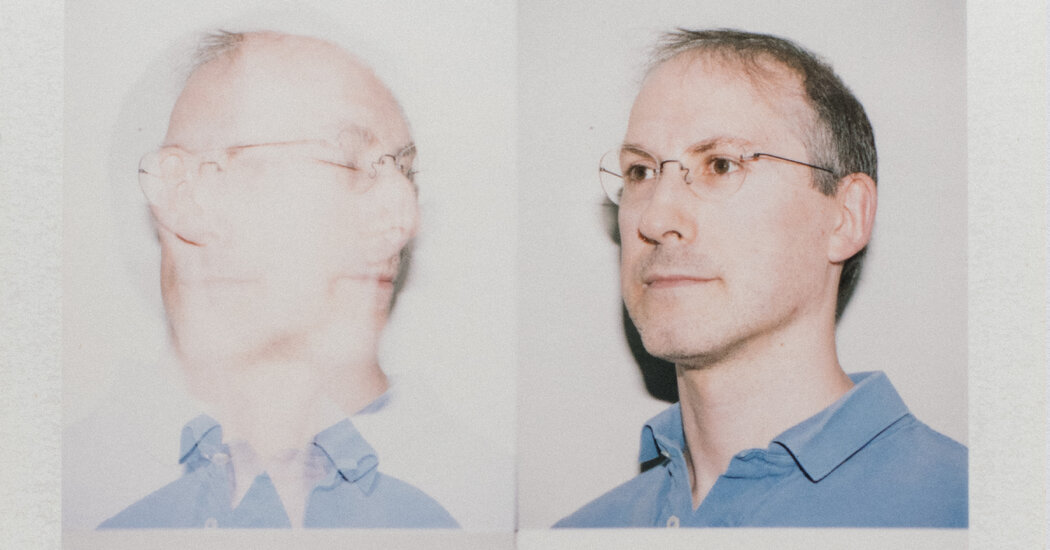In 2018, Aaron Greenspan was a 30-something tech entrepreneur wondering what he should do with the several million dollars in his pocket.
Unlike many in his rarefied demographic, he did not feel called to invest in start-ups, or to launch another of his own. He wasn’t moved by the prospect of homeownership; he didn’t even buy a car. His only splurge was an order of five long-sleeved T-shirts, on sale. As for the rest of his nest egg? He decided to use it to bet against the tech industry, which he saw as a bubble on the verge of bursting.
Over the next several years, he placed financial bets against Facebook, which he believed was rife with fake accounts; and Nvidia, because he was deeply skeptical of crypto companies, some of Nvidia’s key customers at the time. He built up a significant position in an index fund that allowed him to short the Nasdaq because he believed that tech stocks had galloped ahead of any price that their future earnings could justify.
Some of his deepest convictions were about Tesla, which he came to see as an elaborate exercise in market manipulation. In August 2018, Elon Musk, the company’s chief executive, posted on social media that he had secured funding to take the electric-vehicle maker private at $420 a share — far above where it was trading — and the stock appreciated soon after. But the Securities and Exchange Commission said the post misled investors and accused Musk of securities fraud the next month. Musk and Tesla agreed to a $40 million settlement soon after.
“Because he was in the cross hairs of the government, I was like, ‘How solid is this business really?’” Greenspan recalled.
Greenspan, who is skilled in pressuring courts and government agencies to cough up confidential documents through records requests, was able to unearth other inconvenient details. He got his hands on previously confidential evidence that Tesla had acquired SolarCity, in which Musk was an investor, to save that company from collapse. He prodded a California agency to release documents suggesting that Musk was publicly estimating higher sales than Tesla was in private.
He eventually compiled these details into a 100-page report raising questions about Tesla’s financial prospects. From 2018 to 2020, he spent more than $1 million on so-called put options that would have been valuable if the share price had declined.
Instead, the stock appreciated as much as twentyfold over the next few years. Greenspan’s million dollars evaporated, as did the money he used to bet against Facebook, Nvidia and the Nasdaq, and he says he is now broke. His only reliable source of income is a legal document website that he operates, called PlainSite, which he says brings in about $2,000 a month.
“The idealist in me is a little bit dangerous,” he said. “It’s caused me to lose money.”
Curiously, though, Greenspan did not give up. He took it as an opportunity to double down. Somewhere along the way, his crusade became less about making money than a kind of Ahabian obsession — one that seems to grow along with his tormentor’s presence on social media and in the news.
He has continued to exhume documents that raise doubts about Tesla’s business prospects, which he often funnels to reporters. Some of his discoveries have even undermined Musk’s claims about the self-driving technology that helps justify the company’s eye-popping valuation.
“Greenspan has brought many things to light about Tesla and other big tech companies before anyone else has spotted them,” said Lora Kolodny, a CNBC reporter who has relied on Greenspan’s documents and broken a number of stories about Musk and Tesla. Several of her competitors have also leaned on Greenspan and his site to help generate scoops.
And yet, for all Greenspan has brought to light, there is no sign that the revelations have pierced the aura around Musk, who has become the richest person on the planet, or Tesla, which remains one of the world’s most valuable companies.
“Part of me thinks I sound like a crazy person ranting,” Greenspan said this summer. “But the more I think about all this kind of stuff, the more I am both certain and astonished that it’s not more widely discussed.”
For better or worse, he has devoted the last seven years of his life seeking to correct that oversight, to the exclusion of the things that often anchor a life: a career, financial security, adequate sleep.
Has it been worth it?
‘houseSYSTEM’ vs. Facebook
Now 42, Greenspan is thin with sharp, angular features that make him look a bit like the singer James Taylor in middle age. He has an almost perpetually exasperated affect.
The first time I met him was a dozen years ago, while reporting a story about the coder and transparency activist Aaron Swartz, who shared Greenspan’s interest in making information widely available. Swartz killed himself after federal prosecutors charged him with hacking into M.I.T.’s computer network, from which he had downloaded scholarly articles so that the public could have free access to them.
I had come to San Francisco to cover a memorial event for Swartz and ran into Greenspan in the lobby. I asked how he fit into the world of coders and activists represented there. “Well,” he said earnestly. “I created Facebook.”
As a Harvard junior a decade earlier, Greenspan had started a website called houseSYSTEM, which included a “Universal Face Book” feature consisting of photos submitted by Harvard students.
That fall, Greenspan began emailing with a sophomore named Mark Zuckerberg. When Zuckerberg mentioned that he was considering making an app that was similar to another part of houseSYSTEM, Greenspan suggested that they work together. Zuckerberg declined, but spent a lot of time on the houseSYSTEM site in January.
After Zuckerberg launched thefacebook.com the next month, it resembled Greenspan’s creation. But it had a feature that allowed users to connect their pages to their friends’ pages, which seemed to drive The Facebook’s rapid uptake on campus while Greenspan’s version stalled out.
Greenspan concedes that the social networking element of The Facebook was important, but he was convinced that Zuckerberg had ripped him off. “Remember the Website you signed up for at Harvard two days before we met in January, 2004, called houseSYSTEM?” he wrote in an open letter to Zuckerberg a few years later. He added: “Fortunately, even though I shut down houseSYSTEM, I can still use those same features on Facebook.”
Greenspan eventually filed petitions with the U.S. Patent and Trademark Office seeking to undo Facebook’s trademarks, and the two sides settled in 2009.
Still, Greenspan didn’t let it rest. He wrote in The Huffington Post the next year that “what Mark has done with my idea” was impressive in the way that “what Stalin did for Russia in the mid-twentieth century was impressive.” He accused Zuckerberg of having “extremist ideas” about user privacy and argued that sensitive user data in Facebook’s possession could be considered a national security issue.
Mutual acquaintances and online rubbernecks generally chalked up Greenspan’s criticism to jealousy: He struggled to land a job in tech while his nemesis was becoming a billionaire. “If I mentioned my role in Facebook’s creation during interviews, people would give me strange looks and accuse me of lying, as if I were psychotic,” he wrote in a memoir he self-published at age 25. “Yet if I didn’t mention it, as became the case more and more often, then I was nothing special.” (Through a spokesman, Zuckerberg declined to comment.)
What seemed to bother him as much as his job prospects was that his contributions would be lost to history. In 2011, Greenspan sued the studio behind the “The Social Network,” as well as the publisher and author of the book on which the Zuckerberg biopic was based, for defamation over his absence from the narrative. Greenspan argued that the omission damaged his reputation and inaccurately celebrated Zuckerberg, and that the author had borrowed excessively from his memoir. A judge dismissed the case.
Turning Against Big Tech
Greenspan’s suspicions of the founder class did not stop him from trying to join it again. During the period when he was lobbing grenades at Zuckerberg, he was also building a product called FaceCash, an alternative to debit cards that would allow people to pay for purchases using their phone and verify them with an image of their face.
He was feeling optimistic after launching the product and winning over some customers and vendors in the early 2010s. “That would have transformed my life,” he said. “I could point to something where I’d been successful.”
But wire-transfer and money-order companies pushed to enact a California law that in effect devastated the business by requiring an almost-impossible-to-obtain license. Greenspan challenged the state law in court, and the lawsuit was eventually dismissed in 2015. He shelved the product and let go of several employees and contractors while awaiting an outcome.
Frustrated that he had little visibility into the case while it languished in court, he decided to start a website in 2011 — PlainSite — that would collect legal filings so the public could follow cases of interest.
Though similar sites existed, they often had more limited offerings from state courts, and put their documents behind a paywall.
The pivot from tech entrepreneur to activist of sorts wasn’t as radical as it might have appeared. From a young age, Greenspan was driven to fix problems that weren’t obviously his to fix.
In his memoir, Greenspan recalls realizing in middle school that the school district was about to spend $1.5 million buying computers of questionable quality from an obscure vendor. “They’re really going to buy $1.5 million worth of crap,” he wrote, channeling his eighth-grade self. “Unbelievable.” He spilled the beans to a local reporter, and the district later shifted course.
As his own tech-entrepreneur dreams receded, Greenspan nurtured a new kind of ambition: shining a light on tech companies that he thought posed a threat to the world.
He began following Tesla critics on social media and examining lawsuits filed against the company, many of which accused it of safety lapses or quality issues. Soon he also began filing requests for nonpublic documents with courts and state agencies. One later produced a memo from the California Department of Motor Vehicles revealing that a top Tesla engineer had said Musk’s public optimism about self-driving cars “does not match engineering reality,” as the agency summarized it.
Greenspan is not alone in his views on Musk. In an earlier time, a serial over-promiser like Musk would most likely have been checked by government regulators or financial markets, said Mihir Desai, a finance professor at Harvard Business School who has followed the company. But, Dr. Desai added, in an era when conventional authority has broken down and many Americans treat investing as a form of wish-casting unconnected to fundamentals, Tesla’s stock price can be propped up by an “impregnable system of beliefs” that Musk has spread among his fans, akin to “a religion.”
A few months after Greenspan began tweeting his concerns about Tesla’s vehicles and placing his financial bets, he said, a swarm of Tesla true believers began to harass him online.
As the back-and-forth escalated, one Tesla loyalist, who tweeted under the handle @tesla_truth, accused him of tax fraud, extortion, cyberstalking, misuse of a charitable foundation and serial rape. Greenspan said all the accusations were false.
Greenspan filed a lawsuit, but it was aimed not just at his online harasser. It went at Musk’s role in seeding the near-religious faith in his company, naming Musk and Tesla as co-defendants. The suit argued that Musk and Tesla were at the center of a conspiracy to manipulate the share price of Tesla, and that the conspiracy came to include influencers like @tesla_truth, who were rewarded for promoting its brand and attacking critics.
The owner of the @tesla_truth account, who has used a different account for several years, said in an email that he had received a revenue share from Twitter for widely viewed accounts, but that Tesla and Musk had never paid him. He said that Greenspan had harassed him and other Tesla supporters online and that he didn’t mean the rape claim literally and later deleted the tweet.
In seeking to dismiss the case, lawyers for Musk and Tesla have described Greenspan as a “serial litigant” pushing an “unintelligible laundry list of disconnected grievances.”
A federal judge dismissed the case in 2022 but allowed Greenspan to refile several claims, and the case is ongoing. Musk has personally signaled his irritation. Twitter suspended Greenspan’s accounts in 2023, and Musk appeared to refer to Greenspan’s lawsuit as “nuts” in a post this summer. (Representatives for Musk did not respond to a request for comment.)
Musk’s lawyers may have a point: At times, Greenspan can overstate evidence in a way that sounds like conspiracy theorizing. This spring, for instance, after a prominent journalist noted on social media that several of President Trump’s policy decisions appeared to benefit Russia, Greenspan responded: “Why can’t you just say he’s a Russian asset?”
Greenspan’s supporters see it differently. Metin Eren, a friend from college, likened Greenspan’s crusades to the television show “The X-Files,” about an agent for the Federal Bureau of Investigation who investigates supernatural activity. “A very good analogy for Aaron is Fox Mulder,” he said. “Everyone sees him as this guy shouting at the heavens about aliens. But at the end of the day, the aliens exist.”
‘No One’s Coming to the Rescue’
In early May, I met Greenspan in a country where he had temporarily fled just before Trump’s inauguration — he wasn’t taking any chances after years of hounding the president’s top donor. He was staying in a spare Airbnb whose laminated wood floors had recently been pulled up because the kitchen sink had flooded.
Greenspan generally wakes up as the financial markets are opening in New York. He spends a few hours checking on individual stocks and the general rhythms of trading while maintaining PlainSite and flagging the latest outrage to reporters.
He also frequently receives requests from people who want him to suppress their legal records. He typically refuses anytime there is a bona fide legal dispute or an actual crime, however obscure the supplicant may be.
“Sorry, we live in America,” he said. “It’s public information.”
In some cases, this is only the beginning of a headache. In 2016, a Massachusetts man convicted of a violent crime in Spain asked that PlainSite remove the records of his case and, according to Greenspan, began to threaten him when he refused.
Greenspan won a restraining order. The man insisted he had not threatened Greenspan and sought his own restraining order, which was denied. (The man’s rationale was that Greenspan had a weapon: his computer.) The two have been in litigation for years.
Some friends worry that this reluctance to pick his battles has hurt him. Perhaps no more so than his preference for handling his own cases — partly an outgrowth of a contempt for lawyers that he nursed during his ill-fated FaceCash case.
Though he has gotten remarkably far representing himself in litigation — it turns out that the law is not so different from coding, a set of arcane rules that can be incredibly powerful once mastered — the challenges facing so-called pro se litigants are legion. As Greenspan once told me, judges often assume such litigants are mentally ill.
At times even he assumes that all his efforts will eventually come to nothing — or worse. A judge could ask him to pay legal fees for Musk and the other defendants in his lawsuit, who may seek hundreds of thousands of dollars.
Still, Greenspan decided to take his chances and come home when Musk announced in May that he was leaving his government position in Washington.
As the date of his flight approached, he began to stress over how he would transport a hard drive’s worth of Tesla material. He worried about being stopped by immigration officials and spirited away to some windowless room. He asked if I would write a news article if he was detained.
The return went off without incident. And not long after, he got a bit of good news: The judge in his sprawling case against Musk and Tesla had declined to dismiss most of the counts, sending them back to state court instead, where they had been earlier in the process. A California judge is scheduled to rule in November on whether to move forward with the lawsuit, which could provide more detail into the company’s financial maneuverings.
After all the years litigating against Musk, and more than two decades since he first clashed with Zuckerberg, his motivations were still somewhat ambiguous. Did he just want to be proved right in a yearslong debate with Tesla boosters — and, really, the entire stock market? To save the world from someone he saw as a menacing billionaire?
Or, maybe, what he needed was a purpose.
“This is the only vehicle — no pun intended — to investigate the circumstances around what has now become this like cataclysmic disaster of Elon assuming so much power,” he said. “No one’s coming to the rescue.”
Noam Scheiber is a Times reporter covering white-collar workers, focusing on issues such as pay, artificial intelligence, downward mobility and discrimination. He has been a journalist for more than two decades.
The post What If You Spent Every Waking Moment Taking On Elon Musk? appeared first on New York Times.




